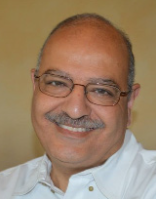About
This book focuses on Egyptian Colloquial Arabic, the most widespread spoken Arabic variety which is perceived as the lingua franca in the Arab world. The material of the book covers about 15-16 weeks of study for classes meeting twice a week (80 minutes/session). This material can be modified according to the teacher’s plan and speed. Students with only one introductory course of Arabic can use the book for self education. The learner can tell easily from the introductory chapter, the quality of the grammatical notes, verb conjugations…. and exercises spread all over the book that the book is written for both regular language class purpose at the university level and for self education. The book has recordings that are essential for learners.
I should acknowledge that Dr Munther Younis from Cornell was the first person who inspired me to write these dialogues while teaching at Cornell. He also introduced me to the importance of teaching the dialect in class together with MSA through the philosophy of the integrated approach of teaching Arabic to non native speakers.
The sociolinguistic situation in the Arab world is characterized by what is known as “diglossia”. The formal written language, known as Modern Standard Arabic (MSA), is taught in schools, and is the medium of education, formal speaking, and virtually all writing. The spoken dialects, which vary regionally, are the native languages of Arabs and are used for ordinary, everyday communication. Most American schools and universities have chosen to focus on literacy in Arabic as the basic skill and hence focus on MSA. However, materials focusing on MSA are often grammar based and neglect the real everyday language in the Arab world. This book is dedicated for teaching of speaking skills that are important and necessary for students whose goals may include, travel abroad to study or work in an Arab country, among others. The book reflects the sociolinguistic reality of speaking Arabic in Egypt where people communicate using their dialect not MSA. -Ragy Mikhaeel, September 2024
About the Author

Ragy is a native of Cairo, Egypt. He taught Arabic at Cornell University, Ithaca College, and Hobart and William Smith Colleges before coming to Northwestern. He is the author of Barron’s Learn Arabic: The Fast and Fun Way (as Ragy H. Ibrahim), which focused on the Egyptian spoken dialect, and has worked on several curriculum development projects, including the preparation of an Egyptian dialect version of Munther Younes’s Living Arabic textbook. From 1993–2002, Ragy worked as a journalist for Al-Ahram Weekly (Cairo), covering art, politics, the environment, popular science, and gender. He received the 2015 Excellence in Foreign Language Teaching Award from the Council on Language Instruction (CLI) and the 2017-2018 Provost’s Fellowship for Digital Learning Award for developing an online tool for his Arabic language students to interact with audio and video explanations while analyzing annotated texts from the Arabic Manuscripts from West Africa collection in Northwestern’s Herskovits Library of African Studies.

